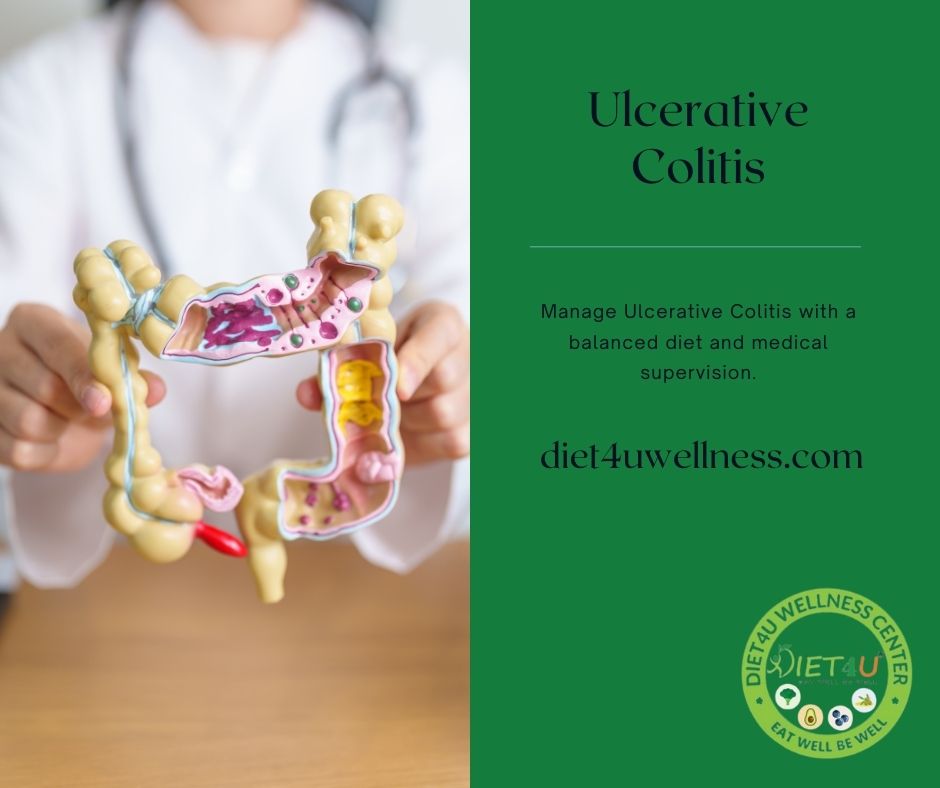
Nutritional Guidelines for Ulcerative Colitis Patients
Table of Contents
- 1 Nutritional Guidelines for Ulcerative Colitis Patients
- 1.1 Symptoms of Ulcerative Colitis
- 1.1.1 Types of Ulcerative Colitis
- 1.1.2 Diet for Ulcerative Colitis
- 1.1.3 What food should be eaten in Ulcerative Colitis?
- 1.1.3.1 Food recommendations for Ulcerative Colitis
- 1.1.3.2 7-Day Meal plan for Ulcerative Colitis
- 1.1.3.3 Foods to avoid in ulcerative colitis
- 1.1.3.4 FAQs Regarding Ulcerative Colitis
- 1.1.3.4.1 Does ulcerative colitis go away?
- 1.1.3.4.2 What food should be avoided in ulcerative colitis?
- 1.1.3.4.3 What is the life expectancy of ulcerative colitis patient?
- 1.1.3.4.4 How serious is ulcerative colitis?
- 1.1.3.4.5 What is the last stage of ulcerative colitis?
- 1.1.3.4.6 What is the best cure for ulcerative colitis?
- 1.1 Symptoms of Ulcerative Colitis
It is a type of inflammatory bowel disease or syndrome (IBS). It causes inflammation and sores in the digestive tract of the gut. The site of inflammation are the parts of the large intestine i.e. the colon and the rectum mainly. Now, as we know that the primary role of rectum is to store and hold the faeces until it’s time to excrete it out. Sores and ulcers in the inner lining of rectum, thus could be immensely painful while the defecating. The colon muscles also start functioning abnormally, causing sudden spasms.
Symptoms of Ulcerative Colitis
Symptoms of the following disease, develop over a period of time and can become life-threatening if not treated at the right time. Some of the symptoms include:
- Rectal pain and rectal bleeding
- Painful episodes during defecation
- Abdominal pain and cramps
- Faeces along with pus, blood and mucus
- Weight loss, fatigue and even fever
- Difficulty in defecation even after proper stimulation or urgency
Types of Ulcerative Colitis
Ulcerative Colitis can be classified into various types, depending upon their site of occurrence.
- Pancolitis: In this types, it affects the colon entirely. Symptoms include bloody diarrhoea, abdominal pain, cramps and fatigue, leading to gradual weight loss.
- Left-sided colitis: In this type, the inflammation goes uptill the rectum causing bloody diarrhoea, abdominal cramps and pain towards the left side especially.
- Proctosigmoiditis: Inflammation extends from the sigmoid part of colon uptill the rectum. Symptoms are overlapping like diarrhoea, irregular bowel movement irrespective of sufficient stimulus.
- Ulcerative proctitis: In this types, the inflammation is limited to the rectum, which stores the faeces until one defecates. Hence, in this types, there could be inccidents of bloody defecation, bloody rectum and painful bowel movement.
Diet for Ulcerative Colitis
Eventhough the symptoms start appearing from a long time, people often ignore the symptoms which makes the condition too severe, before proper treatment and diagnosis. The symptoms should not be ignored, even if they seem normal or common in the initial days. Along with proper diagnosis and treatment, a healthy and balanced diet specially curated for their needs, is extremely important. One should follow a diet which would no aggravate the symptoms, and for that the diagnosed patient should consult a dietician like Dr. Rukhsana Azhar could be contacted or could also follow the articles by DIET4UWELLNESS.
What food should be eaten in Ulcerative Colitis?
A balanced and healthy diet should be enough to make a huge difference in controlling the painful symptoms of ulcerative colitis. Some of the healthy habits to be followed in such patients can be like.
- Eliminating the food which enhance or aggravate the symptoms.
- Staying hydrated. Drinking enough glasses of water everyday would help in flushing out all the waste substances and prevent from toxic substance build-up.
- Eating food slower than normal. This would prevent from taking up of too much air and becoming gassy in the gut.
- Regular exercises and maintaining a healthy lifestyle.
- Preventing too much of ready-made and preservative loaded food.
Food recommendations for Ulcerative Colitis
- Low fiber fruits like avocados, bananas are easily available in the market and can be made a part of the daily lifestyle. Avocados are rich in nutrients and high in antioxidants but low in calorie. Bananas are rich in minerals like potassium and are very high in calories. One banana in the morning will keep one full, for a very long time. Also, in patients with constipation problems as one of the symptoms, should definitely include banana in their diet, as this high calorie yellow fruit helps in regular bowel movement.
- Lean protein sources like types of fish like salmon, tilapia, chicken, eggs and tofu. Even though, they are not high protein sources, these are enough to produce sufficient amount of essential nutrients needed for daily functioning. Vegetarians on the other hand, can choose soy, tofu or almond milk.
- Vegetables like cucumbers, potatoes, squash etc. can be consumed daily to maintain a well-balanced diet. Vegetables are known to provide a wide range of minerals and vitamins. But, as vegetables are rich in fibres, it is recommended to remove the skin (which contains the dietary fibres) and seeds, and then cooking it properly, before consumption. Removing the skin and seed would make it more tolerable. When consumed, the vegetables should be steamed, boiled, grilled or air-fried and deep-frying should be avoided.
- Sources of grains and cereals like white rice, brown rice, oatmeal and breads provide carbohydrates, vitamins and minerals which are needed by the body. High fiber food and cereals are not really recommended for such patients. Whole wheat sources are difficult to breakdown, so refined grains are to be consumed. This is only recommended for patients suffering from ulcerative colitis and not for people with normal dietary conditions.
- Sources of probiotics like curd, yoghurt, kimchi and sauerkraut are important part of the diet as they replenish the gut bacteria in our body. Such gut-friendly bacteria are needed to breakdown the food one consumes.
7-Day Meal plan for Ulcerative Colitis
A 7-day meal prepared specially by a board-certified dietician would help in controlling the symptoms of ulcerative colitis. The food items included should be anti-inflammatory and should be easy to breakdown.
| Monday | Tuesday | Wednesday | Thursday | Friday | Saturday | Sunday | |
| Breakfast | A bowl of oats with lactose-free milk like almond milk or soymilk. | A bowl of fresh fruit salad along with a glass of almond milk. | Air-fried sweet potato along with a bowl of curd. | A glass of smoothie made of banana and Greek- yoghurt along with strawberries. | 4 slices of white bread along with peanut butter. | A bowl of vegetable upma along with one banana. | A bowl of masala oats along with slices of cucumber. |
| Lunch | Grilled chicken breast along with slices of cucumber. | Roti along with fish curry. | 1 cup of brown rice along with soya chunk curry. | 1 cup of brown rice along with grilled salmon fish and green salad. | 1 cup of brown rice along with grilled tofu. | 1 cup of brown rice along with mushroom curry. | 2 Roti along with chicken breast. |
| Dinner | Grilled salmon seasoned with natural seasonings like lemon juice, garlic and pepper. | 2 roti with beetroot salad and curd. | 1 bowl of brown rice along with mixed vegetables. | 2 roti along with soy chunk curry. | A bowl of egg and vegetable salad. | A bowl of vegetable upma along with a bowl of curd. | 1 cup of rice and a bowl of grilled tuna seasoned with lemon and spices. |
Foods to avoid in ulcerative colitis
Eventhough there is no as such food list that needs to be followed in patients with ulcerative colitis, but it is important to prevent food items that would increase inflammatory symptoms. Food like
- Red meat like mutton, pork and lamb are best if avoided. Red meat are high in fat and protein, these are harder to digest than white meat like chicken.
- High sugar drink, food and refined sugar. Refined sugar are used in conventional cookies, pastries. They lead to sugar level spike in blood and hence can be irritable in such patients.
- Processed and ready-made food which are loaded with artificial preservatives and salts are to be avoided as much as possible.
FAQs Regarding Ulcerative Colitis
Does ulcerative colitis go away?
Ulcerative colitis is a type of chronic disease which develops gradually over a long period of time. Initially the symptoms may seem not so alarming hence are often overlooked by the patients. If not diagnosed at an earlier stage, symptoms might get worse and could be life threatening.
What food should be avoided in ulcerative colitis?
High fibre food like whole wheat bread and cereals are rich in fibers and hence is harder to breakdown. Extremely fatty food like read meat (mutton, pork) should be avoided as well, as they could trigger inflammation.
What is the life expectancy of ulcerative colitis patient?
As it is a chronic disease, it does not really affect the life-expectancy, but it definitely affects the quality of life of a person. As this causes painful ulcers and inflammation in the inner lining of the large intestine, so if not treated, doing daily chores become difficult.
How serious is ulcerative colitis?
It is not generally life threatening but it affects the quality of life led by a patient. It causes extreme ulcers and sores in the gut and leads to irregular bowel movement, constipation and even bloody diarrhoea.
What is the last stage of ulcerative colitis?
The last stage or end-stage of ulcerative colitis is characterised by shortening of the length of colon (a part of the large intestine). Colon harbours good gut bacteria which further helps in breakdown of the food we eat. So, if colon gets shortened, less gut bacteria would be present as a result indigestion, irregular bowel movement and even constipation.
What is the best cure for ulcerative colitis?
The only two options available for the cure of ulcerative colitis are medication and in advanced stage, surgery is the only option. If diagnosed early, medications along with a proper, balanced diet and regular exercise cures the condition.

Hello My Name is Dt. Ruksana Azhar and I am a certified dietician and providing online & offline services for Weight Management, PCOS/PCOD Management, Diabetes Management , etc. I have 12+ years of experience in the Apollo Hospital Delhi , Max Super Specialty Hospital Delhi, Lilavati Hospital Mumbai and VLCC healthcare Mumbai. I loves to write healthcare and lifestyle related blog. My favorite part of being a doctor is the opportunity to directly improve the health and wellbeing of my patients and to develop professional and personal relationships with them.



